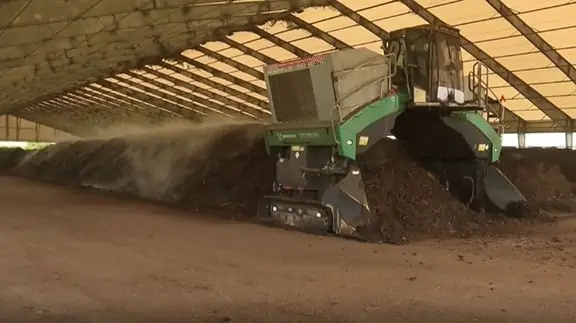

Biosolids Composting – Award Winning Facility in Hillsborough County – Environmental Category
The Planning Commission celebrated its 40th Annual Planning & Design Awards at a ceremony in late October. The event is in conjunction with a nationwide celebration of the American Planning Association’s National Community Planning Month.
The County Planning Commission recognized a joint effort between the County Board of County Commissioners, the Solid Waste Management Department, the County Water Resources Department, and SCS Engineers with its 2022 Excellence Award.
Hillsborough County combines tons of mulched yard cuttings and biosolids (treated wastewater residue) to create an in-demand soil amendment. Mixing, curing, and selling the product preserves disposal space at the Southeast Hillsborough County Landfill, saving taxpayers about $1.5 million in hauling, disposal, and other costs over five years. Selling the resulting soil supplement, meanwhile, adds new revenue.
Yard waste was traditionally burned to produce electricity or mixed with cover at the landfill. Treated wastewater by-products, known as biosolids, were trucked to the landfill for disposal, thus filling the landfill faster and, when combined with other organic matter creating greenhouse gases.
The plan to produce and sell compost results from a partnership between the County operations and SCS Engineers committed to finding a more efficient and environmentally friendly solution to reuse the two types of waste. The product meets stringent federal guidelines and regulations, providing a nutrient-rich material that safeguards consumers, crop production, and the environment.

Thanks to everyone who joined the celebration showcasing excellence in planning and design that contributes to the quality of life in Hillsborough County. If you’d like to learn more about this biosolids composting facility, please contact Kollan Spradlin or .
Communities across our nation are going greener, we suggest these educational resources:
SCS Engineers launched a successful new program enabling waste managers and facilities to pilot test Aerated Static Pile (ASP) composting before making a capital investment. There is a high interest in organic materials management (e.g., composting, anaerobic digestion), driven by state and local regulations for diversion of organics from disposal facilities and the desire to reduce carbon emissions.
The organic fraction of any waste stream is successfully compostable, including materials, such as food scraps, yard trimmings, food processing by-products, and biosolids. The organic fraction of the municipal waste stream, which includes food scraps, is about 30 percent by weight, so it is possible to divert a significant amount from landfilling. SCS helps waste managers evaluate their organic waste streams and whether composting is a viable solution for their circumstances. ASP composting is often the preferred method because it is fast, cost-efficient, and controls odors and emissions effectively.
SCS owns a covered ASP compost system that is mobile and can be set-up on sites within an area of 50 feet by 100 feet, or less. In the covered ASP compost system, process and odor control is pro-active with a shorter composting period. A pilot test allows waste managers to assess composting and to see if it is the right fit for their situation. The ASP system processes material batches in two months. Additional batches or “recipes” can test in 2-month intervals.
SCS’ services include the setup and operation of the mobile ASP system. The system can compost up to 50 tons of targeted material per batch. SCS provides all equipment and consulting services, along with the test reports with the process and lab data. The resulting report and data are useful information to supplement a feasibility study (e.g., the quality of the end-products for sale or community use).
Greg McCarron of SCS Engineers comments, “Virtually every town can develop and support a compost program that is locally based and directly beneficial to their community. Our mobile ASP system can provide proof of concept for our clients and the information that allows managers to make informed decisions.”
Covered ASP Pilot Program details.